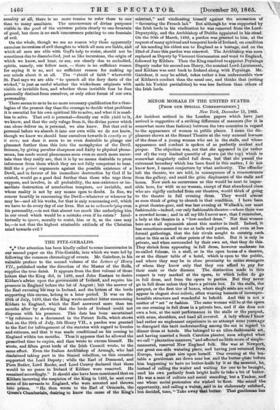THE FITZ-GERALDS.
Our attention has been kindly called to some inaccuracies in our second paper on the Fitz-Geralds, into which we were led by following the common chronology of events. Mr. Gairdner, in his valuable preface to the second volume of the Letters of Henry VII., published under the direction of the Master of the Rolla, supplies the true dates. It appears from the first volume of those letters that the King did, in 1486, send John Eustace to desire Kildare's advice upon the government of Ireland, and require his presence in England before the 1st of August ; but the answer of the Earl excusing his 'stay in Ireland, and the letters of the lords supporting this excuse, belong to a later period. It was on the 28th of July, 1490, that the King wrote another letter summoning Kildare to England, which the Earl answered more than ten months after by showing that the lords of Ireland could not dispense with his presence. This date has been ascertained "by reference to a document in the Patent Rolls, which shows that on the 29th of July, 5th Henry VII., a pardon was granted to the Earl for infringement of the statutes with regard to liveries and retinues, and that it was made conditional on his coming to England within ten months. Thus it appears that he allowed the prescribed time to expire, and then wrote to excuse himself. He wrote, and ftf ten great lords of the Irish Council wrote, to the same effect. Even the Italian Archbishop of Armagh, who had disclaimed taking part in the Simnel rebellion, on this occasion supported the Lord Deputy ; while the Earl of Desmond, and Piers Butler, Lord Roche, and Lord Courcy declared that there would be no peace in Ireland if Kildare were removed. He remained accordingly." It should also have been mentioned that on Kildare incurring the suspicion of the King in 1493, he sent over some of his servants to England, who were arrested and thrown into prison. " He then wrote to the Earl of Ormonde, the Queen's Chamberlain, desiring to know the cause of the King's
mistrust," and vindicating himself against the accusation of " favouring the French lad." But although he was supported by the Irish lords in his vindication he was removed from the Lord- Deputyahip, and the Archbishop of Dublin appointed in his stead. On the 30th of March, 1493, a pardon was granted to him, at the request of many spiritual and temporal lords Of Ireland, on condition of his sending his eldest son to England as a hostage, and on the 22nd of June this pardon was renewed. The Archbishop was soon replaced as Deputy by Viscount Gormanston and went to England, followed by Kildare. Then the King resolved to appoint Poynings Deputy under his second son Henry, the nominal Lord-Lieutenant, and Kildare was sent back to Ireland along with Poynings. Mr. Gairdner, it may be added, takes rather a less unfavourable view of Kildare's conduct than the usual one, and thinks that (setting aside his Yorkist partialities) he was less factious than others of the Irish lords.






























 Previous page
Previous page